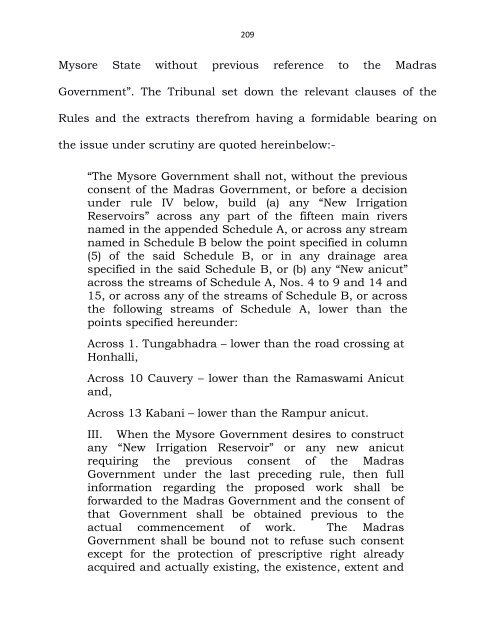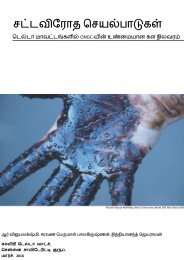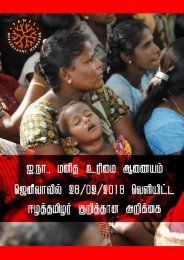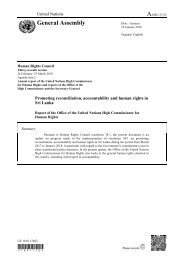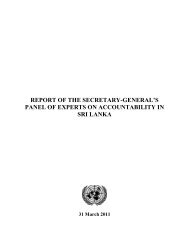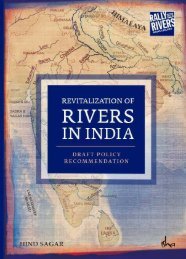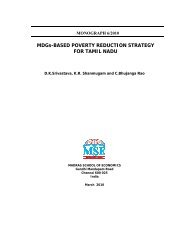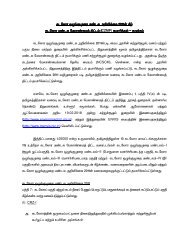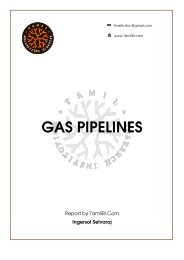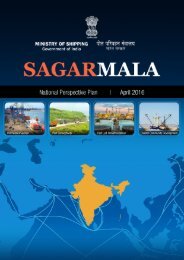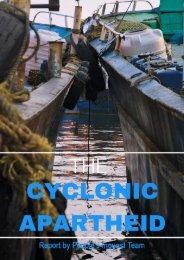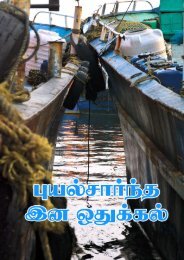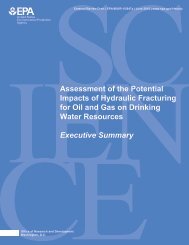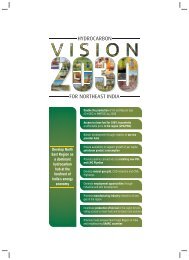- Page 1 and 2:
REPORTABLE IN THE SUPREME COURT OF
- Page 3 and 4:
3 L. Issue relating to expiry of th
- Page 5 and 6:
5 X. Our findings on issues of allo
- Page 7 and 8:
7 The said submissions shall be not
- Page 9 and 10:
9 6. Per contra, Mr. Fali S. Narima
- Page 11 and 12:
11 During the course of proceedings
- Page 13 and 14:
13 The deponent had further submitt
- Page 15 and 16:
15 situation of shortage of water a
- Page 17 and 18:
17 suggested anything with regard t
- Page 19 and 20:
19 Founding Fathers had not conferr
- Page 21 and 22:
21 C. Stand of all parties pertaini
- Page 23 and 24:
23 justice, took the same on record
- Page 25 and 26:
25 of the 1956 Act. In the said com
- Page 27 and 28:
27 referring the dispute to the Tri
- Page 29 and 30:
29 ―No. 21/1/90-WD Government of
- Page 31 and 32:
31 maintainable in law and, accordi
- Page 33 and 34:
33 objections were again raised on
- Page 35 and 36:
35 sought to negate the effect of t
- Page 37 and 38:
37 Government may, by order, as occ
- Page 39 and 40:
39 action taken thereunder, being c
- Page 41 and 42:
41 arguments and we shall be dealin
- Page 43 and 44:
43 (7) Is the State of Karnataka en
- Page 45 and 46:
45 (20) What is the extent of addit
- Page 47 and 48:
47 as per averments in paragraphs 3
- Page 49 and 50:
49 (49) What directions, if any, sh
- Page 51 and 52:
51 Having narrated the facts to thi
- Page 53 and 54:
53 Resident could not accept the De
- Page 55 and 56:
55 constructed within the Mysore St
- Page 57 and 58:
57 final and should such compensati
- Page 59 and 60:
59 to the maximum height of 124 fee
- Page 61 and 62:
61 the impounding therein, shall be
- Page 63 and 64:
63 interpretation or operation or c
- Page 65 and 66:
65 WHEREAS on the 18th February 192
- Page 67 and 68:
67 storage from Krishnarajasagar to
- Page 69 and 70:
69 discussed with the Union Ministe
- Page 71 and 72:
71 "(i) To collect all the connecte
- Page 73 and 74:
73 (ii) To assess the availability
- Page 75 and 76:
75 under an award given, or purport
- Page 77 and 78:
77 terms. It was because of the uni
- Page 79 and 80:
79 could not be maintained at the s
- Page 81 and 82:
81 under Section 87(1) of the Reorg
- Page 83 and 84:
83 aforesaid expressed by Hon‘ble
- Page 85 and 86:
85 such agreement as is therein ref
- Page 87 and 88:
87 into by the Government of India
- Page 89 and 90:
89 And again:- ―Such cases can on
- Page 91 and 92:
91 transferred to the new Governmen
- Page 93 and 94:
93 agreements since they are relata
- Page 95 and 96:
95 Meanwhile the Secretary of State
- Page 97 and 98:
97 suggested to strengthen the Dam.
- Page 99 and 100:
99 78. Be it noted, initially, the
- Page 101 and 102:
101 by the Ruler of the Indian Stat
- Page 103 and 104:
103 denouncement of the 1886 Lease
- Page 105 and 106:
105 jurisdiction of this Court is b
- Page 107 and 108:
107 is appositely read and understo
- Page 109 and 110:
109 Majesty or the Government of th
- Page 111 and 112:
111 agreements, treaties, covenants
- Page 113 and 114:
113 General under Section 6 of the
- Page 115 and 116:
115 subject only to the provisions
- Page 117 and 118:
117 of Accession, and are wrongfull
- Page 119 and 120:
119 Article 363 of the Constitution
- Page 121 and 122:
121 concerned having arisen before
- Page 123 and 124:
123 apply to it is incorrect. Accor
- Page 125 and 126:
125 historical events as background
- Page 127 and 128:
127 therefore within the province o
- Page 129 and 130:
129 this Court under Article 32 to
- Page 131 and 132:
131 102. Be it noted, the larger Be
- Page 133 and 134:
133 without fear of any contradicti
- Page 135 and 136:
135 the section now before us is ap
- Page 137 and 138:
137 The dispute was not settled by
- Page 139 and 140:
139 Where freedom of contract is ab
- Page 141 and 142:
141 bargaining power between the pa
- Page 143 and 144:
143 116. In Delhi Transport Corpora
- Page 145 and 146:
145 2. Any dispute arising out of t
- Page 147 and 148:
147 existed in 1892 or 1924 but def
- Page 149 and 150:
149 (b) Belgaum district except Cha
- Page 151 and 152:
151 Singh & Ors. 21 , Ranjan Sinha
- Page 153 and 154:
153 administration of the new State
- Page 155 and 156:
155 enacted in that behalf. Therefo
- Page 157 and 158: 157 inasmuch as the newly created S
- Page 159 and 160: 159 the terms and conditions of the
- Page 161 and 162: 161 distribution of benefits to be
- Page 163 and 164: 163 (2) Subject as aforesaid, the G
- Page 165 and 166: 165 twice stated that both the agre
- Page 167 and 168: 167 with the Rules of Regulation se
- Page 169 and 170: 169 arrangement as set out in claus
- Page 171 and 172: 171 Agreement after the expiry of 5
- Page 173 and 174: 173 height of water level ranging b
- Page 175 and 176: 175 the basis of the Agreement of 1
- Page 177 and 178: 177 experience gained and upon exam
- Page 179 and 180: 179 continued solely because of the
- Page 181 and 182: 181 149. Relying on the said provis
- Page 183 and 184: 183 Tribunal) (supra). In the backd
- Page 185 and 186: 185 for irrigation are required to
- Page 187 and 188: 187 made than a just and reasonable
- Page 189 and 190: 189 (ii) The second view is based o
- Page 191 and 192: 191 and apply the water so as to ca
- Page 193 and 194: 193 (e) the economic and social nee
- Page 195 and 196: 195 relevant factors are to be cons
- Page 197 and 198: 197 165. The definition of ‗water
- Page 199 and 200: 199 covering the areas of the new S
- Page 201 and 202: 201 Nadu reiterated its demurral th
- Page 203 and 204: 203 State has to be preserved more
- Page 205 and 206: 205 food of the people. It asserted
- Page 207: 207 Basin to which it was entitled.
- Page 211 and 212: 211 of consent. In its turn, the Ma
- Page 213 and 214: 213 any impounding was made in the
- Page 215 and 216: 215 developments made in the differ
- Page 217 and 218: 217 P.2 Breach of agreements of 189
- Page 219 and 220: 219 adjudication. The Tribunal, on
- Page 221 and 222: 221 water in the Kabini, Bhawani an
- Page 223 and 224: 223 noted. It recorded that due to
- Page 225 and 226: 225 Committee also reflected over t
- Page 227 and 228: 227 190. The Tribunal, however, at
- Page 229 and 230: 229 that the utilizable quantities
- Page 231 and 232: 231 concluded that in view of the f
- Page 233 and 234: 233 Water Resources, Government of
- Page 235 and 236: 235 The Tribunal, adverting to the
- Page 237 and 238: 237 and, thus not fully cognizable
- Page 239 and 240: 239 marked the admission of the Sta
- Page 241 and 242: 241 P.5 The principles of apportion
- Page 243 and 244: 243 completely destructive of equit
- Page 245 and 246: 245 remark that equitable apportion
- Page 247 and 248: 247 Court in Kansas v. Colorado (su
- Page 249 and 250: 249 England, 4 th Edition, Vol. 49(
- Page 251 and 252: 251 stated that equitable apportion
- Page 253 and 254: 253 Tribunals would have ample powe
- Page 255 and 256: 255 equitable manner so as to serve
- Page 257 and 258: 257 Having regard to the fact that
- Page 259 and 260:
259 development as contemplated und
- Page 261 and 262:
261 Keeping in view the shortfall i
- Page 263 and 264:
263 prior to the 1924 Agreement, ir
- Page 265 and 266:
265 Agreement till 1974 under Claus
- Page 267 and 268:
267 hand, the parties had pursued t
- Page 269 and 270:
269 in respect of areas requiring i
- Page 271 and 272:
271 70,000 to 90,000 acres. It is w
- Page 273 and 274:
273 already dealt with the same. We
- Page 275 and 276:
275 226. Karnataka, in its statemen
- Page 277 and 278:
277 losses, the percolated water wo
- Page 279 and 280:
279 and useful areas was taken note
- Page 281 and 282:
281 nature of crops which were grow
- Page 283 and 284:
283 ft. to 5.9 ft. The following re
- Page 285 and 286:
285 utilised to meet the in-basin r
- Page 287 and 288:
287 respect of two categories of cr
- Page 289 and 290:
289 236. The Tribunal took into acc
- Page 291 and 292:
291 of the dissension between the t
- Page 293 and 294:
293 that both the States had furnis
- Page 295 and 296:
295 deltas so computed for main cro
- Page 297 and 298:
297 requirement of Karnataka was co
- Page 299 and 300:
299 1. Towns provided with piped wa
- Page 301 and 302:
301 out of 100 units of water initi
- Page 303 and 304:
303 population had been allowed 135
- Page 305 and 306:
305 the industrial water requiremen
- Page 307 and 308:
307 Environmental Engineering Resea
- Page 309 and 310:
309 was the basic occupation of the
- Page 311 and 312:
311 Karnataka based on the project
- Page 313 and 314:
313 equitable share of a particular
- Page 315 and 316:
315 (iv) Main crop in the low eleva
- Page 317 and 318:
317 semi-dry and miscellaneous, ―
- Page 319 and 320:
319 unutilized water from its share
- Page 321 and 322:
321 compulsions, did not have any s
- Page 323 and 324:
323 provision for irrigation water
- Page 325 and 326:
325 was ordered that the same would
- Page 327 and 328:
327 (10 TMC x 2) as advised by the
- Page 329 and 330:
329 286. It was mentioned that the
- Page 331 and 332:
331 287. Deducing therefrom and hav
- Page 333 and 334:
333 TMC at 50% dependability which
- Page 335 and 336:
335 allocation awarded to the parti
- Page 337 and 338:
337 Cauvery Water Regulatory Commit
- Page 339 and 340:
339 Clause-V The Tribunal hereby or
- Page 341 and 342:
341 Pondicherry already in operatio
- Page 343 and 344:
343 Clause-XIV Use of water shall b
- Page 345 and 346:
345 (d) The ―irrigation season‖
- Page 347 and 348:
347 Presidential Reference (Cauvery
- Page 349 and 350:
349 S.2 Submission of Mr. S.S. Java
- Page 351 and 352:
351 Parkinson (Works) Pvt. Ltd., Bo
- Page 353 and 354:
353 or lesser rainfall resulted in
- Page 355 and 356:
355 priority contrary to the rules
- Page 357 and 358:
357 304. He further argued that Kar
- Page 359 and 360:
359 construct a reservoir of 45 TMC
- Page 361 and 362:
361 310. He submitted that the Trib
- Page 363 and 364:
363 313. He then contended that the
- Page 365 and 366:
365 Karnataka's entitlement for sec
- Page 367 and 368:
367 considered at all. The evidence
- Page 369 and 370:
369 He submitted that the river was
- Page 371 and 372:
371 323. He also set out the three
- Page 373 and 374:
373 for Karnataka's Kharif paddy ha
- Page 375 and 376:
375 These resources were under-util
- Page 377 and 378:
377 adhered to the 1924 Agreement t
- Page 379 and 380:
379 months and, thus, such water co
- Page 381 and 382:
381 that any shortfall could be adj
- Page 383 and 384:
383 by adding irrigation components
- Page 385 and 386:
385 facet of equitable apportionmen
- Page 387 and 388:
387 submissions, a thorough underst
- Page 389 and 390:
389 Agreement. As the 1892 and 1924
- Page 391 and 392:
391 distribution in Kerala was such
- Page 393 and 394:
393 348. He also challenged the Tri
- Page 395 and 396:
395 V. Submissions urged on behalf
- Page 397 and 398:
397 water included groundwater, no
- Page 399 and 400:
399 further there is a constitution
- Page 401 and 402:
401 another v. State of Karnataka 5
- Page 403 and 404:
403 said Agreement, the accusations
- Page 405 and 406:
405 of water by each basin State, s
- Page 407 and 408:
407 some identifiable flexibility o
- Page 409 and 410:
409 basis of the whole. The above f
- Page 411 and 412:
411 any interconnections between aq
- Page 413 and 414:
413 in development planning, the po
- Page 415 and 416:
415 the needs of the State concerne
- Page 417 and 418:
417 production, was also underlined
- Page 419 and 420:
419 eventualities. Having regard to
- Page 421 and 422:
421 adjustment of the available res
- Page 423 and 424:
423 Puducherry, Mysore and Kerala h
- Page 425 and 426:
425 the State of Tamil Nadu, Karnat
- Page 427 and 428:
427 (v) No lift schemes. 382. As th
- Page 429 and 430:
429 the Tribunal on the basis of th
- Page 431 and 432:
431 equally balanced and to reitera
- Page 433 and 434:
433 relieved the Union Territory of
- Page 435 and 436:
435 Resources of Cauvery Delta esti
- Page 437 and 438:
437 safe quantity to be accounted f
- Page 439 and 440:
439 and the rest would return to th
- Page 441 and 442:
441 census, district-wise and the a
- Page 443 and 444:
443 sprawling, vibrant and a much a
- Page 445 and 446:
445 6.52 TMC for existing water sch
- Page 447 and 448:
447 resources by human beings compo
- Page 449 and 450:
449 UT of Pondicherry : 7 TMC Envir
- Page 451 and 452:
451 own use during any water year s
- Page 453 and 454:
453 (c) the holding of a minimum nu
- Page 455 and 456:
455 discretion to be exercised by i
- Page 457 and 458:
457 framing the scheme is exclusive
- Page 459 and 460:
459 (iv) The newly formed States ne
- Page 461 and 462:
461 (ix) We do not find any pervers
- Page 463 and 464:
463 (xvii) In totality, we deem it
- Page 465:
465 407. In the ultimate analysis,


